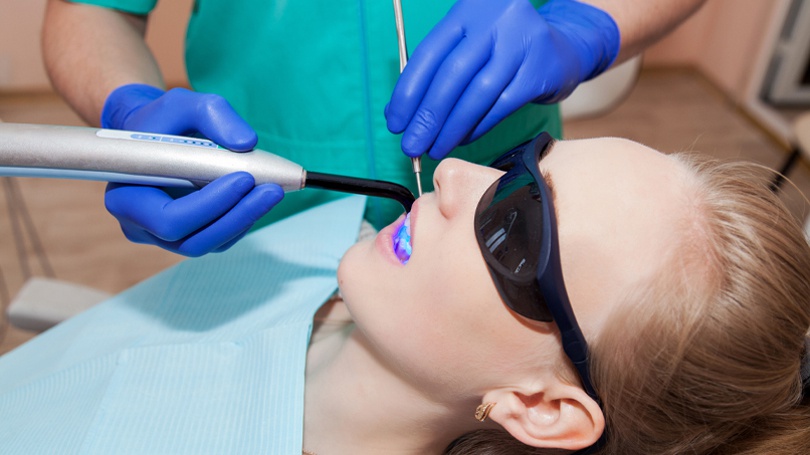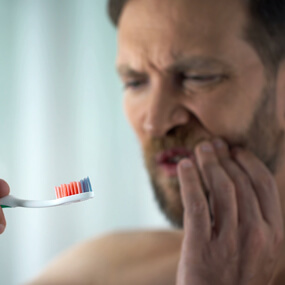Can You Benefit From Sedation Dentistry?

Does the mere idea of seeing a dentist send shivers down your spine? You are not alone. In fact, surveys indicate that about 30 million Americans skip routine dental care for no other reason than anxiety—or what the experts call dentophobia. The problem with this is that at-home oral hygiene often is not enough on its own to avoid gum disease and tooth decay, and you miss out on potential early diagnoses. Dentists are often crucial to the early diagnosis of diabetes, bruxism, oral cancer, and so forth.
The Sedation Solution
Sedation dentistry is a safe and effective technique that allows people with dental phobia to get the oral care they need but without all of the anxiety while in the chair. There may still be some anxiety in the lead-up to the visit, but even that will fade over time since each visit will no longer be an ordeal. How does sedation dentistry work? Well, it varies depending on the technique used. It can induce a sense of deep relaxation, affect the central nervous system to reduce the flight response, or even avoid memories of the experience altogether. The common sedation options include:
- Nitrous oxide: Often referred to as laughing gas, nitrous oxide is introduced through the nose and results in a mild form of sedation characterized by relaxation and euphoria.
- Sedative: A sedative is a pill taken when you get to the office but before you go in to see the dentist. It produces a state of deep relaxation and greatly reduces and even eliminates anxiety.
- IV drip: Intravenous sedation involves a sedative concoction introduced via the bloodstream. This works fast and can be particularly effective when a patient requires multiple procedures.
Nitrous oxide is used in the most common form of sedation dentistry. Sedatives have become more prevalent, and it was only recently that IV sedation could be used for anything other than oral surgery. With advancements in anesthesiology, those laws have been relaxed. IV sedation can now be used for extensive treatments, invasive treatments, and patients with deep levels of anxiety.
What Are the Benefits of Sedation Dentistry?
Eliminating anxiety is, by far, the greatest benefit. People with dental phobia can overcome this limitation and get the dental care they need. No longer does someone have to live with gum disease, tooth decay, tooth loss, and so forth simply due to irrational fear. There are other benefits too, however.
- There are people who do not have dental phobia but have a gag reflex so intense that it makes dental exams and treatments difficult and even impossible. Gagging often has both a physiological and psychological component. Often, nitrous oxide is enough to relax such patients so that they no longer have that involuntary urge to choke, gasp, and tense up when being treated.
- Some people do not have dental anxiety but rather trypanophobia—the fear of needles. Needles are often necessary in dentistry to give a patient local anesthesia, which makes most treatments painless. In these scenarios, a mild sedative can be taken first, and once the person is relaxed, the dentist can then apply the local anesthesia as he or she would with any other patient.
- Many patients do not have a dental phobia but get nervous and therefore tense due to various triggers, such as the sound a dental drill makes or various smells and other noises. This is prevalent in patients who have general anxiety disorders or who are suffering from post-traumatic stress disorder. Sedatives are quite effective at muting the responses to these various stimuli.
- Even in a patient who has no anxieties, an extended treatment period can take its toll. If a patient requires extensive care, sedation dentistry makes it possible to carry it out in a single visit. In the past, it was often necessary for the same treatments to require several or more visits.
- There are patients who prefer or, through a recommendation from a doctor, need to have no memory of the treatment at all. This can be accomplished with IV sedation. The patient is sedated enough that he or she dozes off. The subconsciousness is deep enough that the patient forms no memories during the treatment. This is often used for people who have had traumatic dental care experiences.
Note that the use of sedation dentistry is not limited to adults. These methods are suitable for children as well. If treatment will be particularly invasive or extensive, sedation dentistry is often recommended in order to avoid the stress that can come with it. If a child shows signs of dentophobia, sedation dentistry can also be used to ensure that dental anxiety never really develops.
Do All Dentists Offer Sedation Dentistry?
No! Despite the fact that dental anxiety is a widespread issue, not all dentists get certified, and there are various certifications required for the different types of sedation. Worse yet, not all dentists have a great chairside manner. Most do since it is an integral part of patient care, but some develop a mindset that dental phobia is something a patient must get over rather than manage.
Dr. Jeffrey D. Clark and his entire team at Scottsdale Cosmetic Dentistry Excellence recognize the reality of dentophobia and the effect it can have on you. We have dedicated ourselves to compassionate and empathetic dental care, and that includes making the latest sedation methods available to you. We encourage our patients to tell us about their fears so that we can discuss how to overcome them.
If you are anxious, we will review your sedation options in advance of treatment. We will answer any questions you may have and will make recommendations based on your unique circumstances. Our ultimate goal is for you to have the peace of mind needed to get the dental care you need.
Enjoy Peace of Mind and Excellent Oral Care
Our patients at Scottsdale Cosmetic Dentistry Excellence deserve the very best dental care available. Many patients require assistance so that they can relax and get that care. Each patient is unique. Jeffrey D. Clark, DDS, is a premier dentist in Arizona who is certified in sedation techniques and is diligent about personalizing the care he provides to each and every patient. Call 480 585 1853 today to learn more about the sedation methods we have available and to schedule your appointment.




